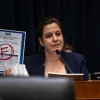
A passerby walks by means of a gate to the Harvard College campus, Tuesday, Jan. 2, 2024, in Cambridge, Mass.
Steven Senne/AP
disguise caption
toggle caption
Steven Senne/AP
Harvard College has agreed to strengthen its insurance policies in opposition to antisemitism on campus as a part of a settlement of two federal lawsuits accusing the college of not doing sufficient to forestall antisemitic discrimination and harassment.
Beneath the deal, Harvard will undertake the broad Worldwide Holocaust Remembrance Alliance (“IHRA”) definition of antisemitism, which considers sure instances of anti-Zionist or anti-Israeli criticism as antisemitism. Critics say the definition is overly strict and wrongly conflates the 2, and can stifle free and open educational inquiry. Harvard calls the transfer considered one of many “robust steps” that may be sure that “Jewish and Israeli students are treated in the same manner and with the same urgency as all protected groups.”
As a part of the deal, Harvard will put up an explainer stating that “For many Jewish people, Zionism is a part of their Jewish identity” and also will listing examples of antisemitism, resembling “excluding Zionists from an open event, calling for the death of Zionists, applying a ‘no Zionist’ litmus test for participation in any Harvard activity.”
Harvard additionally agreed that for the following 5 years it is going to publicly share the outcomes of alleged instances of antisemitism together with complaints of different types of bias. College students have accused Harvard of being extra lax when imposing harassment and discrimination insurance policies involving Jews, in contrast with Black or LGBTQ college students, for instance.
Harvard says it is going to mandate outdoors coaching for employees reviewing antisemitism complaints, and can make investments extra sources to review antisemitism, together with internet hosting an annual educational symposium on the subject, internet hosting a wide range of occasions on campus and partnering with an Israeli college.
“When fully implemented, this agreement will help ensure that Jewish students are able to learn and thrive in an environment free from anti-Semitic hate, discrimination, and harassment,” mentioned Kenneth L. Marcus, former U.S. assistant secretary of schooling and chairman of the Brandeis Middle for Human Rights Beneath Legislation, which filed one of many lawsuits accusing Harvard of violating Title VI of the Civil Rights Act of 1964. That prohibits discrimination based mostly on race, faith and nationwide origin in colleges that obtain federal funds.
Harvard additionally agreed to an unspecified financial cost, however the college didn’t admit to any wrongdoing.
“We are committed to ensuring our Jewish community is embraced, respected, and can thrive at Harvard,” the college mentioned in an announcement. “We are resolute in our efforts to confront antisemitism.”
The settlement was welcomed by many on campus, together with Harvard Legislation faculty professor Noah Feldman. He says the clarification was particularly wanted within the wake of the congressional listening to the place Harvard’s then-president, Claudine Homosexual, struggled to reply whether or not sure eventualities would cross the road into prohibited antisemitic conduct.
“The truth is, as a matter of law, it does depend,” says Feldman, so it is essential that Harvard has now articulated extra clearly the factors it is going to use to find out what crosses the road. However, he says, it isn’t very completely different from the principles it has utilized up to now.
“It’s a commonsensical balance,” he says. “People have to be able to say whatever they believe, and you need a respectful community where all participants can take part in debate without being bullied, harassed or discriminated against. These are both equally important parts of the university’s core mission.”
However the settlement drew indignant rebukes on campus and on-line, together with from the Harvard Undergraduate Palestine Solidarity Committee. The group accused Harvard on social media of utilizing a “widely contested” definition of antisemitism to “silence support for Palestinians.”
One other consumer, recognized as Jayanti Leslie-Iyer, a Harvard pupil, replied “it’s insane that harvard has exceptionalized [sic] israel and zionism to be above criticism.”
Violet Baron, a Harvard junior and organizer with the group Harvard out of occupied Palestine in addition to Jews for Palestine, calls the settlement “extremely dangerous.”
Baron says she has been amongst these protesters chanting “Zionists are not welcome here.”
“To me that’s like saying racists aren’t welcome here,” she says. “Zionism is a political ideology, and for Harvard to protect Zionists, perhaps at the expense of free speech, that is not what combating antisemitism looks like. That’s what policing speech looks like.”
Marc Kasowitz, the legal professional who introduced the lawsuit and negotiated the settlement with Harvard, vehemently rejects such arguments.
“There’s nothing about our settlement that prohibits or limits political speech in any way, shape or form,” he says. “However, if anyone expresses the idea that they believe Zionists should not be welcome at Harvard, because of a belief that [they] have in the existence of the state of Israel, that sounds very antisemitic to me.”
A number of different colleges have just lately settled related lawsuits, and fits are pending in opposition to others, together with the College of Pennsylvania and Columbia College.
However at Harvard, even this settlement doesn’t fully settle the problem.
One pupil who was a part of the lawsuit declined to be a part of the deal, and is taking his declare to trial as an alternative. A federal decide already has dominated in opposition to Harvard’s bid to get the case dismissed, saying “Harvard failed its Jewish students” and that the college “cannot hide behind the First Amendment” to keep away from complying with anti-discrimination legal guidelines.







